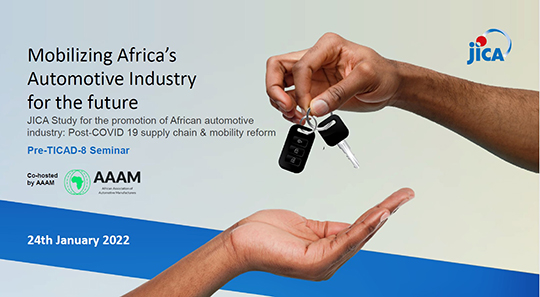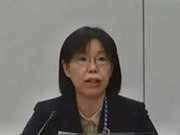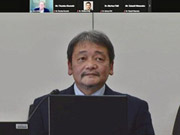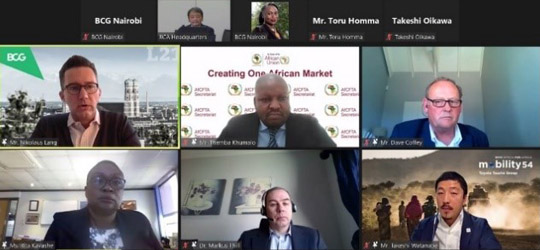Mobilizing Africa's Automotive Industry for the future: Final Seminar for Study for the Promotion of the African Automotive industry (TICAD8 Pre-Event)
Day:2022.01.24
event |

The final seminar for JICA's "Study for the Promotion of African Automotive Industry: Post-COVID 19 Supply Chain & Mobility Reform" was held online on 24 January 2022, co-hosted by JICA and the African Association of Automotive Manufacturers (AAAM). The seminar attracted nearly 400 registrations and close to 300 participants from over 20 countries in Africa and beyond, drawn from a variety of stakeholders including representatives of national government institutions, private sector automotive companies, regional and national industry associations, intergovernmental organizations and development partners.
Ms. Keiko Sano, Director General of the Economic Development Department of JICA, opened the seminar by highlighting the importance of the African automotive industry given rising demand for vehicles in the region and significant trends impacting the sector, such as the COVID-19 pandemic, CASE (Connected, Autonomous, Shared, and Electric) innovations, de-carbonization regulations and the African Continental Free Trade Area (AfCFTA). Mr. Dave Coffey, Chief Executive Officer of AAAM and co-host of the event, emphasized that the time is now for Africa to industrialize as the last major opportunity in the global automotive sector, but that this will require courageous leadership and deliberate interventions based on clear and coordinated strategies across governments.
Next, key findings from the study were presented by the research team on the status of the industry across the region. Looking to the future, the team identified four vision objectives for the industry: increased regional integration, adaptation to new technologies (e.g., new energy vehicle) by North African and South African exporters, the emergence of regional vehicle assembly hubs in the rest of Sub-Saharan Africa, and downstream transformation through aftersales formalization and innovative mobility solutions.
The seminar then turned to a panel discussion facilitated by moderator Dr. Nikolaus Lang, Managing Director and Senior Partner at the Boston Consulting Group, with five distinguished industry experts sitting on the panel. Panelist Themba Khumalo, Principal Advisor on Industrial Development at the AfCFTA Secretariat, highlighted the opportunities that a single integrated market of 1.3 billion people can provide to the automotive industry given the importance of economies of scale in manufacturing, and shared that progress is being made in ongoing negotiations to conclude Rules of Origin that support value chain development and foster industrialisation.
Mr. Dave Coffey indicated that new vehicle sales can increase from around one million pre-COVID-19 to five million over the next fifteen years with the right policies and ecosystems, but that it is important that aspiring countries have a pathway to benefit and develop. This will require a "coalition of the willing" between partners across the regions and the continent following a developmental path which is core to the Pan-African Auto Pact proposed by AAAM and AFREXIM Bank.
On the topic of fostering development of aspiring assembly hubs, Ms. Rita Kavashe, Managing Director of Isuzu East Africa, spoke of the importance of the private sector working in partnership with government to find solutions such as regulations of used vehicle imports, as well as the role of vehicle financing in stimulating consumer demand.
Dr. Markus Thill, President of Bosch Africa, highlighted the opportunities for professionalization and employment in the automotive aftermarket given the 50 million or more vehicles that need to be maintained annually across the region, especially given the high degree of low quality and often substandard parts.
Mr. Takeshi Watanabe, Chief Executive Officer of Mobility 54 Investment (part of Toyota Tsusho Group), drew attention to the new innovative mobility services or technologies that provide opportunities in Africa, particularly if digitalization can be used to leapfrog traditional solutions and create new jobs, services and value addition, giving the example of trade platform Sendy in Kenya.
The seminar ended with panellists taking questions from participants, discussing the importance of coordinated and phased policy approaches in the areas of trade regulations and supply chain localization, and was closed by Mr. Toru Homma, Senior Advisor on Private Sector Development from JICA who lead the study and also acted as the event moderator.
The seminar was one of the first pre-events for this year's 8th Tokyo International Conference on African Development (TICAD8). The Final Report for the Study for the Promotion of African Automotive Industry will be published on JICA's website once finalized.

Opening remarks by Ms. Keiko Sano, Director General of the Economic Development Department of JICA

Moderator: Mr. Toru Homma, Senior Advisor of JICA

Panel discussion between leading industry experts (Clockwise from top left: Dr. Nikolaus Lang (BCG), Mr. Themba Khumalo (AfCFTA Secretariat), Mr. Dave Coffey (AAAM), Mr. Takeshi Watanabe (Mobility 54), Dr. Markus Thill (Bosch Africa) and Ms. Rita Kavashe (Isuzu East Africa))
scroll